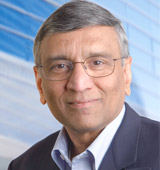|
Executive Interviews: Interview with Bala Chakravarthy on Global Economy and Global Managers
October 2008
-
By Dr. Nagendra V Chowdary
-
Globalization will accelerate,
despite the current difficulties
Despite the problems with the WTO,
world trade is getting freer. Goods,
services, human and financial capital
are moving across national borders
more easily than before. The opening
up of China and more recently India
and others has contributed to this
cause. Firms from the old TRIAD
countries and the new BRIC
countries are chasing similar dreams.
Competition is intensifying. The
firm's leaders have to look for ways to
standardize its operations across the
globe even as they encourage
adaptation to suit local market needs;
they must create a sense of identity
and pride among the firm's
employees even as they recruit amore
diverse work force; they must
encourage speedy decision-making
and yet maintain control; and they
must seek top business performance
and yet ensure strict adherence to the
firm's values. Top management must
master these and other dilemmas in
order for the firm to succeed. -
Social and environmental
performances will grow in
importance
The firm's stakeholders are
getting better organized and getting
more vocal. Awareness of climate
change and industry's contribution to
this problem are growing. In addition
to financial performance, top
management must pay attention to a
firm's social and environmental
performance. These are important for
earning andmaintaining the 'license to
operate.' But actions that enhance
financial performance need not always
help the other two. In fact there can be
serious contentions. It is not enough
for a CEO to merely decree that all
three performance dimensions are
important. The CEO must be a
walking example of how the
underlying dilemmas can bemanaged.
Besides the substantive tradeoffs that
have to be made, there is the added
burden of communicating the firm's position to the media. Media
bandwidth has exploded
exponentially over the past decade.
Channels are chasing scarce content.
Factual reporting and quality analyses
have given way to sensationalism.
News is not just reported but
increasingly manufactured to fill the
airways. The growing popularity of
the Internet has led to instant
diffusion of news, both facts and
rumors, verified and speculative.
Large companies and their leaders are
especially vulnerable targets. One
misspoken word can be ruthlessly
exploited again and again on a global
stage. Top
management has to learn, to
communicate effectively with the
media. -
Business, Government
partnerships will grow
Take major business sectors
like energy, financial services, health
care, transportation or food. All of
these have national security
concerns. Governments will get
involved. Businesses will also need
to partner with governments to
establish fair social and
environmental regulations. In
general, the interplay between
government and business is on the
rise. World Trade is a case in point.
Issues of war, terrorism,
environmental regulation, trade,
currency movements, and taxation
are all matters that are salient to
business but need political
intervention. The role of top
management will grow from being
just a business head to also becoming
an able ambassador for the firm vis avis
its political partners.
|
The Interview was conducted by Dr. Nagendra V Chowdary, Consulting Editor, Effective
Executive and Dean, IBSCDC, Hyderabad. This Interview was originally published in Effective Executive, IUP, October 2008. Copyright © October 2008, IBSCDC
No part of this publication may be copied, reproduced or distributed, stored in a retrieval
system, used in a spreadsheet, or transmitted in any form or medium electronic,
mechanical, photocopying, recording, or otherwise without the permission of IBSCDC. |
